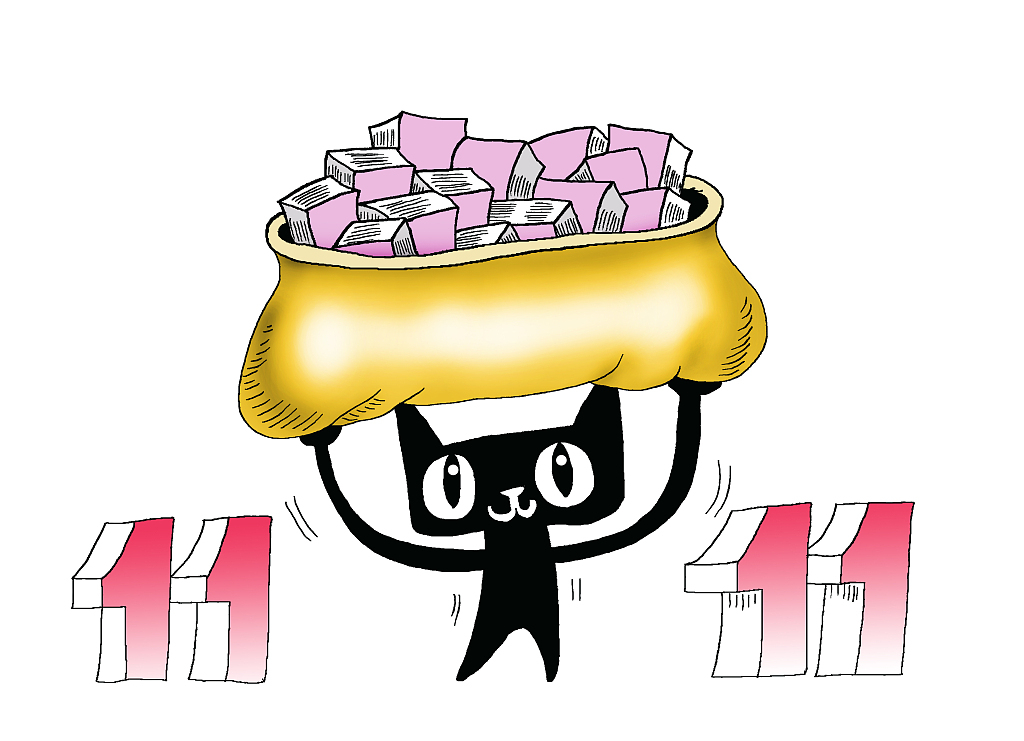
Editor's note: Liu Chunsheng is an associate professor at the Beijing-based Central University of Finance and Economics, and deputy dean of Blue Source Capital Research Institute. The article reflects the author's opinions, and not necessarily the views of CGTN.
During the past decade, the "Double Eleven" shopping festival has grown into one of the most important indicators of China's economy, especially the online consumption.
It has been breaking a series of business records until now. Tmall's transaction reached 10 billion yuan (about 1.43 billion U.S. dollars) within 96 seconds and 100 billion yuan (about 14.3 billion U.S. dollars) within 63 minutes 59 seconds, a lot faster than that of last year. At 8:01 a.m., the packages on delivery from Tmall reached 100 million pieces, 59 minutes earlier than previous year's.
In the last decade, China has gradually been shifting from the world's factory to a global center of science and technology. The "Double Eleven" shopping festival participated, witnessed and accelerated the business transformation, economic development and industrial restructuring.
As a reflection of China's business and consumption, the shopping day has showed a few new trends and new features in recent years. It covers not only a large number of goods from manufacturing to agricultural products but also services including food, movies, games, video, travel, medical care, education, car sales and repairs and even home decoration. The festival swept from online stores to brick-and-mortar stores, from domestic consumers to abroad buyers, and from the first-tier or second-tier cities to the third-tier and rural areas.

Tmall's transaction volume reached 100 billion yuan within 63 minutes 59 seconds, November 11, 2019. /VCG Photo
Tmall's transaction volume reached 100 billion yuan within 63 minutes 59 seconds, November 11, 2019. /VCG Photo
The consumers from first- or second-tier cities pay more attention to the quality of the products, the efficiency of the delivery and after-sale services. The imported goods, personalized products and services have become more popular. With China's demographic and social changes, commodities markets for single people and the aging population are booming. It is expected that with the expansion of the middle-class population, the consumption upgrading will continue. It will not only keep on being the new driver of China's economic growth but also benefit the whole world.
Thanks to the per income growth, the development of infrastructure and thriving of logistics in lower-tier cities and rural areas, the less-developed market is bearing huge potentials of consumption.
"Over the past two years, Taobao and Tmall have achieved an annual growth of over 100 million consumers, with up to 70 percent of new users coming from the sinking market," according to Jiang Fan, president of Taobao at Alibaba Group.
The number of monthly active mobile Internet users in these cities and rural areas stood at 670 billion, hitting 52.9 percent of the total number. The development of these markets plays a more and more significant role in online sales growth. The internet players are emphasizing the strategic layout in these markers.
The new online shopping giant PDD, which targets the market of the lower-tier cities and rural areas, reached its sales figures at 9.4 billion yuan in its first Double Eleven shopping festival in 2018. At the same time, as a representative of Alibaba's life service e-commerce, Fliggy's active users increased by 30 percent, among which the consumers from the lower-tier cities, representing the rise of new forces, increased by 66 percent.
Without any doubt, the rise of lower-tier cities and rural areas will put more impetus into China's online shopping business as well as to the consumption upgrading. For online shopping giants, the sinking market represented by the less-developed areas will definitely become a new "battlefield" of business competition.
(If you want to contribute and have specific expertise, please contact us at opinions@cgtn.com)